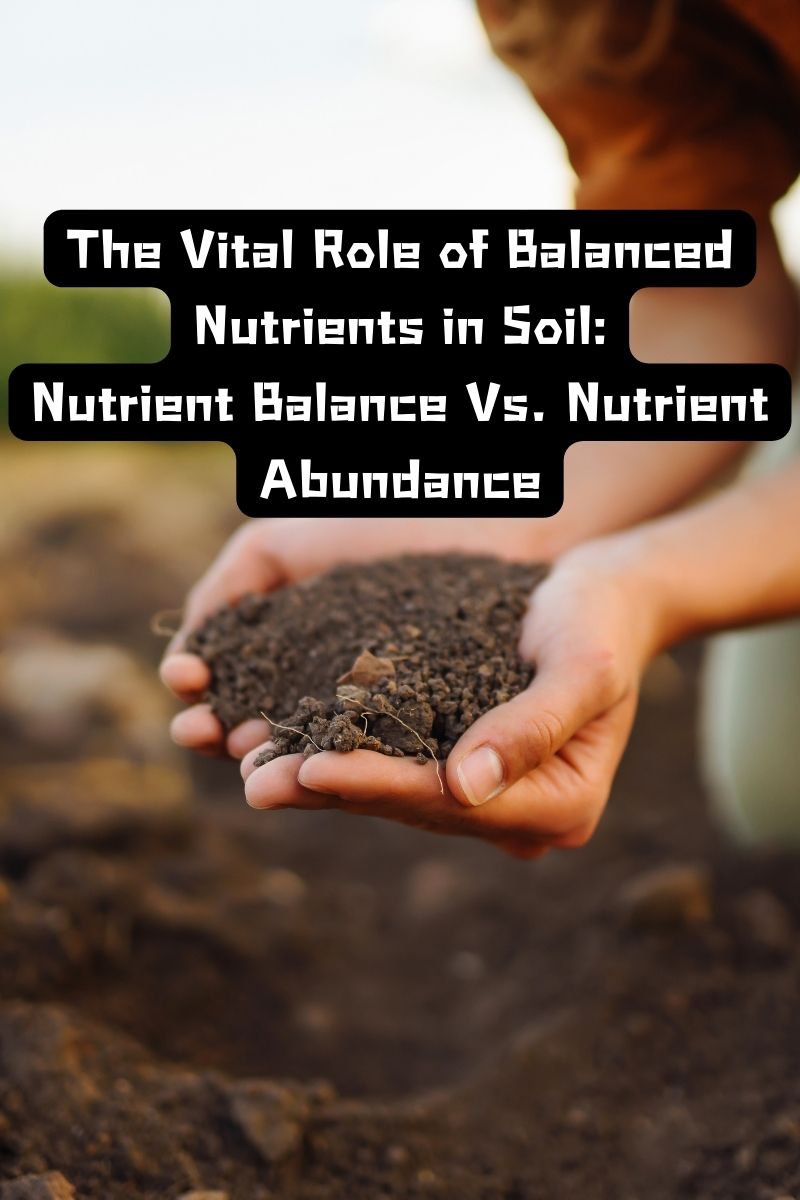
The Vital Role of Balanced Nutrients in Soil; Nutrient Balance Vs. Nutrient Abundance
Share

Written by: Andrew Allen
Introduction:
In the realm of agriculture, the nutrient balance of the soil should take precedence over quantity of nutrients in the soil. While the abundance of nutrients in soil may seem advantageous at first glance, the concept of balance emerges as a crucial determinant of soil health and, consequently, the success of agricultural endeavors. This blog delves into the significance of maintaining balanced nutrients in soil, elucidating why the pursuit of maximizing nutrient quantity may not always yield optimal results.
Understanding Balanced Nutrients:
Soil serves as the lifeblood of agriculture, providing essential nutrients that sustain plant growth and productivity. These nutrients, including nitrogen, phosphorus, potassium, calcium, magnesium, sulfur, and various micronutrients, play distinctive roles in plant development and metabolic processes. Achieving a harmonious balance among these nutrients is pivotal for fostering robust plant growth, enhancing crop yields, and preserving the long-term fertility of soil.
The Pitfall of Excessive Nutrient Maximization:
In the quest for higher yields and productivity, farmers may resort to indiscriminately applying synthetic fertilizers or manure to enrich soil with nutrients. While this approach may initially boost plant growth, it often leads to nutrient imbalances and detrimental consequences for soil health. Excessive application of certain nutrients, such as nitrogen and phosphorus, can result in nutrient runoff, water pollution, and soil degradation. Moreover, the overabundance of certain nutrients may disrupt microbial communities within the soil, impairing its ability to sustain plant growth naturally.
The Importance of Balance:
Balanced nutrients in soil foster a symbiotic relationship between plants, microorganisms, and the surrounding ecosystem. When nutrients are appropriately balanced, plants can efficiently uptake essential elements, leading to optimal growth, improved resistance to diseases, and enhanced nutrient utilization. Furthermore, a balanced nutrient profile promotes soil structure and fertility, facilitating better water retention, aeration, and nutrient cycling. By prioritizing nutrient balance over sheer quantity, farmers can cultivate healthier crops while safeguarding the long-term sustainability of soil resources.
Strategies for Achieving Nutrient Balance:
Maintaining nutrient balance in soil requires a multifaceted approach that integrates scientific knowledge, soil testing, and sustainable agricultural practices. Soil testing serves as a fundamental tool for assessing nutrient levels and identifying potential imbalances, enabling farmers to tailor fertilization strategies according to specific crop requirements. Adopting precision agriculture techniques, such as variable-rate fertilization and targeted nutrient applications, can optimize nutrient use efficiency while minimizing environmental impacts.
Furthermore, embracing regenerative agricultural practices, such as crop rotation, cover cropping, and organic amendments, can enhance soil health and promote nutrient balance naturally. These practices not only mitigate nutrient imbalances but also foster biodiversity, improve soil structure, and mitigate the adverse effects of climate change.
Conclusion:
In conclusion, the importance of balanced nutrients in soil cannot be overstated. Striving for nutrient balance rather than maximizing nutrient quantity is paramount for sustaining agricultural productivity, preserving soil health, and safeguarding environmental integrity. By adopting holistic approaches that prioritize nutrient balance, farmers can cultivate resilient crops, foster soil fertility, and contribute to a more sustainable and regenerative agricultural system for generations to come.
At SD Microbes to effectively achieve nutrient balance in our soils and to make informed decisions about soil management, we use and highly recommend soil testing through reputable laboratories such as Logan Labs. Logan Labs offers comprehensive soil testing services that provide detailed insights into soil nutrient levels, pH, organic matter content, and cation exchange capacity (CEC), among other crucial parameters. By opting for the Complete Soil Analysis with Extras package offered by Logan Labs, farmers can obtain a comprehensive assessment of their soil's health and fertility status.
The Complete Soil Analysis with Extras package includes additional tests such as micronutrient analysis, soluble salts, and exchangeable cations, which offer invaluable information for tailoring nutrient management strategies to specific soil conditions. Armed with precise data from soil testing, farmers can receive customized recommendations for fertilizer applications, soil amendments, and agronomic practices that align with their unique soil characteristics and crop requirements.
Incorporating soil testing into agricultural management practices empowers farmers to make evidence-based decisions, optimize resource utilization, and maximize crop yields while minimizing environmental impacts. By partnering with trusted laboratories like Logan Labs and leveraging their expertise in soil analysis, farmers can embark on a proactive journey towards achieving nutrient balance, promoting soil health, and fostering sustainable agricultural systems.